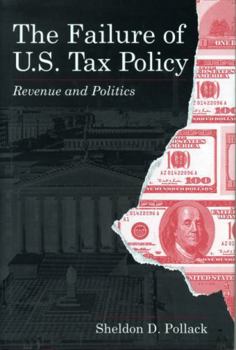The Failure of U.S. Tax Policy: Revenue and Politics
An investigation of the tangled U.S. tax system, which attributes its complexities and inconsistencies to the conflicting aims of its many creators. The federal courts, the IRS, the private tax bar, and individual taxpayers all struggle just to keep up with increasingly complex tax statutes and regulations. The Failure of U.S. Tax Policy surveys federal tax policy in the post-World War II era, with special attention to the last two decades, when it gained much of its complexity. Tax attorney and business law professor Sheldon Pollack shows how the tax policy agenda has been and continues to be influenced by a wide assortment of players, from tax lawyers, the media, and private interest groups and their lobbies to presidential contenders and congressional "policy entrepreneurs," thereby shaping the development of the tax laws.
Format:Hardcover
Language:English
ISBN:0271015829
ISBN13:9780271015828
Release Date:September 1996
Publisher:Penn State University Press
Length:320 Pages
Weight:1.41 lbs.
Dimensions:1.3" x 6.3" x 9.3"
Related Subjects
Business Business & Investing Economics Political Science Politics & Social SciencesCustomer Reviews
1 rating
Useful addition to tax literature
Published by Thriftbooks.com User , 27 years ago
Mr. Pollack's book is an historical and critical review of the politics of the federal income tax. Because he focuses on tax complexity as a political phenomenom, the book is a highly useful addition to the tax literature, and is somewhat unique in its focus. Chapter 7, on the causes of tax complexity, is especially interesting reading. While the causes of tax complexity are well-known, Mr. Pollack does an excellent job of discussing the various causes and why these factors are so intractible. Also useful is his discussion of the tax reform criteria 'fairness' and 'vertical equity'. Pollack points out that these terms cannot be objectively defined- fairness and vertical equity are subjective concepts that continually add to the complexity of the tax code. By and large, the book maintains a dispassionate, impartial attitude toward the tax reform debate. The author adds a 'postscript' on the 'flat tax' that is, however, somewhat partisan, and, for that reason, disappointing. He rails against the 'fairness' of the flat tax, after the bulk of the book is devoted to emphasizing that 'fairness' is a subjective matter. He questions whether the flat tax would really be any simpler than the current income tax. The flat tax is a wage tax; how could it not be simpler? Finally, he notes that there would be significant transition issues to deal with in switching to a different system of collecting revenue. That's certainly correct, but hardly a compelling reason to stick with the current mess






